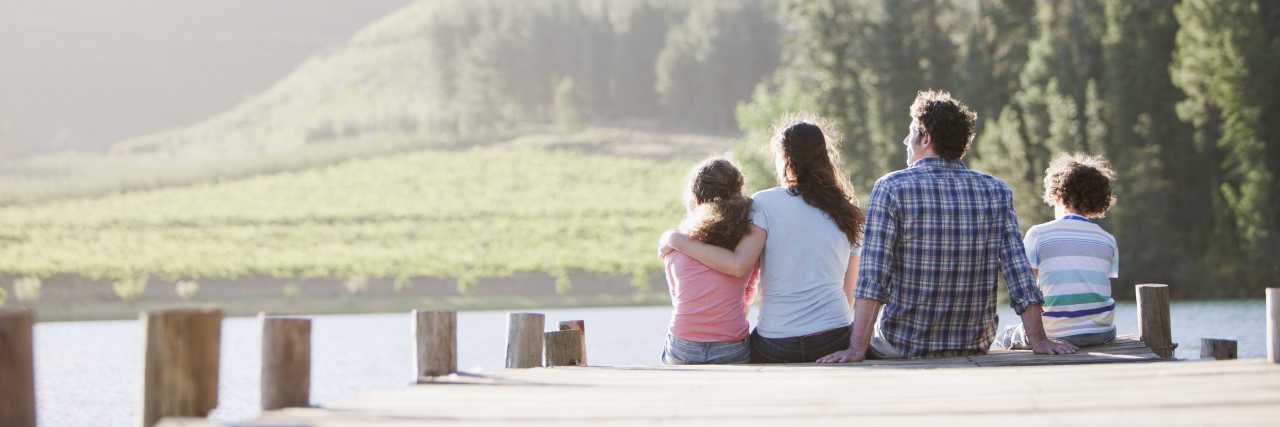Why I Felt Empowered From Accepting We Were a 'Disabled Family'
For me, “disability” is a relative term. In order for someone to be disabled there must be other people who are “abled,” who meet some real or imagined set of criteria that determine ability. By definition then, a disabled person doesn’t meet that criteria.
We are a disabled family. I’ve never found the criteria that would tell me if any of us are “abled,” but together we recognize we are different. We are an autism family because my daughter was diagnosed with autism at age 3. We are an ADHD family because my son was diagnosed at age 8. He added Aspergers and adjustment disorder at age 9. I have chronic depression and anxiety, chronic migraine, and an eating disorder. And my husband, 3 of our 4 children, and I are all gifted. It’s frustrating, loud, dramatic, and often chaotic at our house. It’s also joyful.
I was 21 and married less than a year when we found out I was expecting, and I was elated. Our marriage was just coming out of the “honeymoon phase”’and we simply didn’t feel complete without a baby. I didn’t know I had no clue how to be a mother until I was one, and even within the first six weeks of my daughter’s life I knew something was different. She was incredibly alert but seemed frightened by everything. A sweet older woman at the grocery store told her she was adorable and she immediately began screaming. She screamed so often and so violently I became afraid of her tears and her cries. I was afraid of her intense need for me. She screamed whenever I put her down and the sound terrified me so much that I even held her while I used the toilet. I loved her more than I could have imagined, but her needs were so big I felt weak, worthless, incapable. I loved her, but I was scared of her.
Thus began a combination of depression and anxiety in me that lasted many years. I thought I would be a good mother because I loved my daughter and because I read all the right books, but I was totally inadequate. Yet no one else seemed to understand her either. That’s when I found out I had another baby on the way.
There was no simple answer to how to help my daughter or myself. As each family member went to doctors and therapists and school officials we accumulated labels, but never answers. There was no way to fit my daughter or my son or myself into an exact category or therapy program. None of us were dying or in pain, but none of us would be “cured.” When I grew too exhausted to keep searching for answers in perfect therapies, IEPs, and social skills groups, I finally discovered that the answer is acceptance.
Acceptance was never a consolation prize. Acceptance was the gift. Acceptance was the answer to my kids’ disabilities and my inadequacies. Because once I stopped holding myself and my family to an imaginary media-based standard — that in itself was driven by my own fears — I began to see how blessed I am to raise these children, to walk with them through life.
It’s been close to 15 years since I have birth to my daughter and I’m no longer afraid when I don’t have the answers to her problems or my own. Now I see disability as opportunity. When I encounter something I feel called to learn and do but can’t, that lack of ability becomes a door to new knowledge and perspectives. It also becomes a door to new community as I seek others who have walked the road before me. As a non-autistic parent of two autistic teens, I see them question themselves when they are in situations that seem simple to me but baffling to them, and I don’t know how to help them. What I can do is encourage and empower them to reach out to others while finding their own answers.
Disability comes to us as a gift when its trials teach us both our own power and our own humility. When we’re in pain, in need, afraid, challenged or despairing, we are in just the right place to know that we’ll never have all the answers. In that position the only thing left for us is to reach out — to God, to family and friends, and to our community. It is in receiving help and knowledge and strength from others that we can become empowered through the humility of our disability.
The word “disability” implies a lack of power, and people expect my family to struggle and be less able because of our differences. But our differences are what makes us powerful. When one family member is struggling, the rest of us join forces to help him/her succeed, by both becoming stronger and recognizing and accepting weakness. Our disabilities may represent a lack in certain areas, but strength will never be one of them.
A version of this story originally appeared on Organic Compost.
Follow on Instagram @organic_compost_blog.
Getty image by Tom Merton

